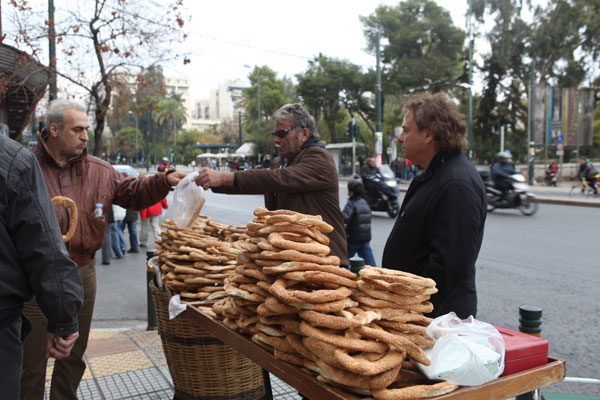Greeks suffer the wounds of austerity cuts
Updated: 2011-11-28 07:22
By Fu Jing (China Daily)
|
|||||||||
 |
|
Cousins Kosta Makrhs and Angflo Drakos can earn the equivalent of a US quarter for each piece of bread they sell a block from Syntagma (Constitution) Square, which is a center for protests of Greece's austerity measures. Makrhs understands austerity. The reeling economy cost him his job as a waiter when the restaurant closed last year. [Photo by Fu Jing / China Daily] |
Anger on the streets as crime, unemployment and suicide rates continue to climb. Fu Jing reports from Athens.
In afternoons, 35-year-old Markos walks his dog in the quiet woods on Mount Lycabettus, overlooking Athens. But he's not in the mood to enjoy the tranquility or the leisure.
All this free time belongs to retired people like his parents, he said. "The problem is that when you get up every day, you don't have something to do."
Markos, who didn't want to be fully identified, was laid off in March by the government-owned Olympic company, which has airline, tourism, real estate and other operations.
Because he speaks fluent English and has experience in tourism promotion, Markos had expected no problems in landing a new job. However, since the debt crisis erupted in May 2010, the government has cut public-sector jobs, as well as salary and social welfare payments.
Meanwhile, uncertainty, panic and pessimism have dominated the country, and investors are not willing to risk opening new businesses. "So finding a job is extremely hard," Markos said.
With the economy shrinking for a fourth consecutive year, the young continue to be the hardest hit. More than four of every 10 people ages 18-25 are out of work.
And their situation is likely to be even worse next year. Both the European Union (EU) and the International Monetary Fund (IMF) have forecast that Greece's economic freefall won't end before 2013.
Not every Greek has responded to the tough times as quietly as Markos, who thinks the new coalition government led by Lucas Papademos will give Greece a new chance. Many others have joined streams of demonstrations.
General strikes in October shut down services across the country for two days, and the trade unions are planning a 24-hour general strike on Thursday to protest next year's austerity budget. It will be the first major walkout since the appointment of the interim coalition government in early November.
Over the past two years, Greeks have held dozens of strikes and demonstrations against the repeated rounds of salary cuts and tax increases. All the pain and hardship have also pushed them to heatedly debate whether to stay in the eurozone.










